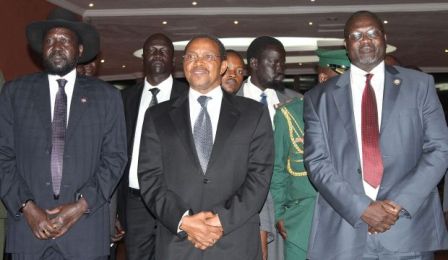S. Sudan dismisses rebel claims on president Kiir’s legitimacy
October 24, 2014 (NAIROBI) – South Sudan government the recent document signed by its various factions in Arusha, under the auspices of Tanzania’s ruling party (CCM) confirms president Salva Kiir as the country’s democratically-elected and legitimate leader.

“Gen. Salva Kiir Mayardit traveled to Arusha, Tanzania wearing all his hats as the chairman of the SPLM, commander in chief of the SPLA, and the legitimate president of the nation, South Sudan,” the South Sudanese embassy in Kenya said in a statement issued Friday.
“He [Kiir] did not go to Tanzania to seek any leadership from anywhere”, it adds.
On Monday, various factions of South Sudan’s ruling party Sudan Peoples’ Liberation Movement (SPLM signed a framework agreement seeking to address the root causes of the conflict that erupted in mid-December and plunged the country into violent crisis.
The document was signed in the Tanzanian northern town of Arusha and witnessed by the two principal rival leaders, namely president Kiir, who chairs the SPLM in government and Riek Machar, the former vice president and now the leader of the SPLM-in-Opposition.
SPLM of former detainees also participated in the talks and inked the document as well.
The SPLM-in-Opposition dismissed allegations suggesting that the Arusha framework agreement had endorsed reuniting the three SPLM factions under the leadership of president Kiir.
“This is not true. It is a misrepresentation of what transpired in Arusha. The framework document has not endorsed any leadership. Actually the agreement has not yet addressed future leadership. It has only outlined guiding principles and set an agenda for future negotiations,” Machar’s spokesperson, James Gatdet Dak told Sudan Tribune on Tuesday.
Dak said substantial issues are yet to be discussed by the three factions, which he said, will include SPLM self-assessment and evaluation that will also look into political, organisational and leadership issues.
The SPLM factions, he added, will also discuss how to reconcile and heal the party as well as come up with implementation mechanisms.
“We are not yet there. The future of leadership will be discussed in the subsequent agendas which will encompass political and organisational issues,” said Dak, saying the framework agreement was simply to launch the process and was not a final agreement.
“A possibility of whether Salva Kiir shall maintain or relinquish the party leadership will be dealt with in the next phases,” he added.
REBEL CLAIMS DISMISSED
But the South Sudanese embassy in Kenya described the rebel statements as “laughable”, saying Kiir never sought leadership from anywhere.
“Those who are chasing the wind around the regional corridors and beyond should bear in mind that at the end of the day, the people of South Sudan will be the ones to decide who their leaders should be,” the embassy said.
“President Salva Kiir Mayardit does not seek endorsement of his leadership in Arusha, Nairobi or Addis Ababa,” it stressed, emphasising that Kiir’s leadership was endorsed by the people of South Sudan whom he sacrificed for and struggled to liberate.
REBELS SHOULD FORM NEW PARTY
The embassy, in its statement, also advised those in rebellion to start their own party, saying their activities were “destructive” to the SPLM and the country where the ruling party was founded.
Delegates of the three rival SPLM groups, on the invitation of CCM leaders, met in Arusha from 12-18 October to try to come up with the framework for the process to pave way for peace and stability.
The framework agreement highlighted preamble, principles, objectives and agenda that will be discussed in the intra-party dialogue. It also included rules of engagement and role of CCM.
“The parties recognize that the Arusha process is essentially an intra-SPLM dialogue and is separate and distinct from the IGAD mediated peace talks among South Sudanese stakeholders. Yet the parties are fully aware that the two processes, although separate, are mutually interdependent and reinforcing,” partly reads a communiqué.
The document recommits the parties to the principles of democracy, internal democracy especially on matters of decision making, elections, succession and peaceful transfer of power.
It further calls for “unity of SPLM as a safeguard against fragmentation of the country along ethnic and regional fault lines.”
The Arusha process is, however, distinct from the ongoing peace talks, which takes place in Addis Ababa, Ethiopia.
(ST).
